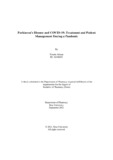Parkinson’s disease and COVID-19: treatment and patient management during a pandemic
Abstract
One of the most remarkable health problems we have faced since the World War II is the COVID-19 outbreak. This review article discusses insights from basic science as well as clinical perspectives on COVID-19 disease with a specific concern on Parkinson’s disease (PD). Patients with COVID-19 have compromised immunity, especially in an aged population suffering from PD. The 1st report on the relationship between COVID-19 and PD comes from the research on antibodies against four antigens of COVID-19 in Cerebrospinal Fluid (CSF) of normal controls compared to patients with neurological illnesses, especially PD. Unfortunately, identification of COVID-19 is difficult in PD patients because PD is often preceded by anosmia, which is a common feature of COVID-19. Presently, no disease-modifying treatment is available for PD. But for temporary relief, the treatment is composed of dopaminergic drugs like levodopa and PD patients with COVID-19 are treated with favipiravir, amantadine etc. where amantadine was the first FDA-approved medicine in the United States that indicates dual function in the treatment of both diseases. This review also discusses the COVID-19 negative impact on PD patients due to lockdown/isolation. To conclude, this review is mainly focused on the COVID-19 and PD relationship, consequences of PD patients infected with COVID-19, treatment options and COVID-19 impact on PD patients.

